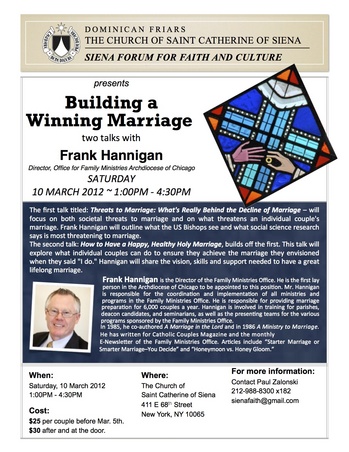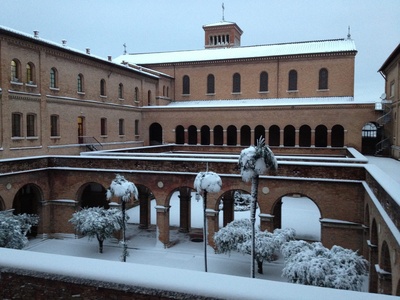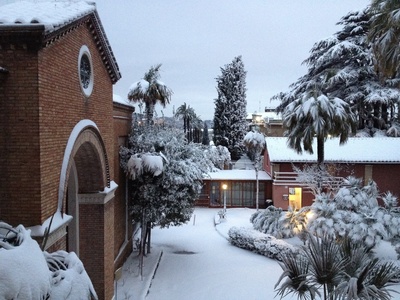Paul Zalonski: February 2012 Archives
It was brought to my attention that we need to ask the Holy Spirit for wisdom. We need help. So ask for it. Let's look at what the Church said at the Second Vatican Council about our own times in Gaudium et Spes:
To carry out such a task, the Church has always had the duty of scrutinizing the signs of the times and of interpreting them in the light of the Gospel. Thus, in language intelligible to each generation, she can respond to the perennial questions which men ask about this present life and the life to come, and about the relationship of the one to the other. We must therefore recognize and understand the world in which we live, its explanations, its longings, and its often dramatic characteristics. Some of the main features of the modern world can be sketched as follows.
Today, the human race is involved in a new stage of history. Profound and rapid changes are spreading by degrees around the whole world. Triggered by the intelligence and creative energies of man, these changes recoil upon him, upon his decisions and desires, both individual and collective, and upon his manner of thinking and acting with respect to things and to people. Hence we can already speak of a true cultural and social transformation, one which has repercussions on man's religious life as well.
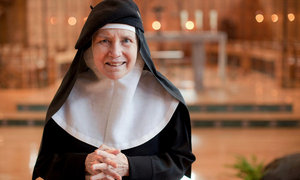 Benedictine nuns typically don't go to the Oscars. For that matter, high profile actresses don't consecrate themselves as Benedictine nuns. Dolores Hart did both.
Benedictine nuns typically don't go to the Oscars. For that matter, high profile actresses don't consecrate themselves as Benedictine nuns. Dolores Hart did both. 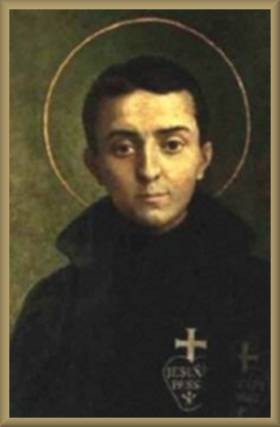 I've always been impressed by the saints and blesseds of the Passionist order. So many have them exemplify what the Christian of today face, Saint Gabriel Possenti and in my opinion help us to strive to be holy.
I've always been impressed by the saints and blesseds of the Passionist order. So many have them exemplify what the Christian of today face, Saint Gabriel Possenti and in my opinion help us to strive to be holy.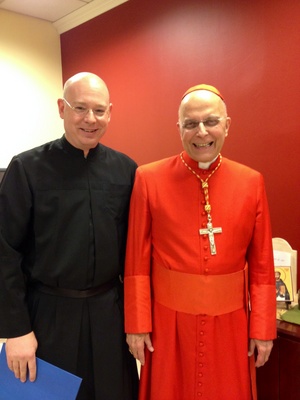 A Christian's observance of Lent brings with it, I hope, a certain discipline of prayer. At The Church of Saint Catherine of Siena (411 East 68th Street, NYC) the Sundays in Lent Solemn Vespers will be celebrated at 4 pm.
A Christian's observance of Lent brings with it, I hope, a certain discipline of prayer. At The Church of Saint Catherine of Siena (411 East 68th Street, NYC) the Sundays in Lent Solemn Vespers will be celebrated at 4 pm.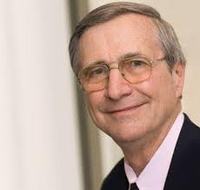 A week ago (February 18, 2012) Dr. Peter J. Kreeft, professor of Philosophy of Boston College and popular Catholic apologist delivered two lectures concerning the conflicts of culture, conscience, freedom and faith in which we find ourselves at these days.
A week ago (February 18, 2012) Dr. Peter J. Kreeft, professor of Philosophy of Boston College and popular Catholic apologist delivered two lectures concerning the conflicts of culture, conscience, freedom and faith in which we find ourselves at these days. 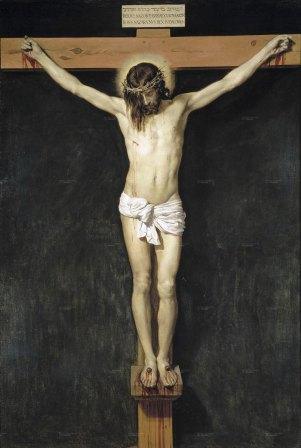
A plenary indulgence is granted to the Christian faithful who:
on any Friday in the season of Lent piously recite the prayer before an image of the Crucified Jesus Christ after communion; ...
Behold, O good and most sweet Jesus, I fall upon my knees before Thee, and with most fervent desire beg and beseech Thee that Thou wouldst impress upon my heart a lively sense of faith, hope and charity, true repentance for my sins, and a firm resolve to make amends. And with deep affection and grief, I reflect upon Thy five wounds, having before my eyes that which Thy prophet David spoke about Thee, o good Jesus: "They have pierced my hands and feet, they have counted all my bones."
Pope Benedict XVI processed from the Benedictine Church of Saint Anselm to the Dominican Church of Saint Sabina on the Aventine Hill. A long standing tradition of the popes, though it was in abeyance for several years until 1979 when John Paul II revived the tradition. The Benedictine monks welcome the Pope and his entourage for a moment of prayer and reflective before processing to the 5th century church of the Dominican Friars where Holy Mass is celebrated with the distribution of ashes. As usual, Cardinal Tomko, the cardinal titular of Saint Sabina's gave Benedict his ashes. The following homily of the Pope's focusses on the origins of this humble sign that assists in our recognition of salvation. Is this our recognition, too?
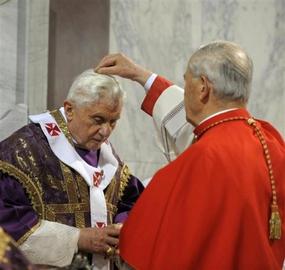
Ash Wednesday is a day of fasting and penance on which we begin a new journey towards the Easter of Resurrection, the journey of Lent. I would like to reflect on the liturgical sign of the ashes, a material sign, a natural element that, in the Liturgy, becomes a sacred symbol, so important on this day that marks the start of our Lenten journey. In ancient times, in the Jewish culture, it was common to sprinkle one's head with ashes as a sign of penance, and to dress in sack-cloth and rags. For us Christians, there is this one moment which has important symbolic and spiritual relevance.
Ashes are the material sign that brings the cosmos into the Liturgy. The most important signs are those of the Sacraments: water, oil, bread and wine, which become true sacramental elements through which we communicate the Grace of Christ who comes among us. The ashes are not a sacramental sign, but they are linked with prayer and the sanctification of the Christian people. Before the ashes are placed on our heads, they are blessed according to two possible formulae: in the first they are called "austere symbols", in the second, we invoke a blessing directly upon them, referring to the text in the Book of Genesis which can also accompany the imposition of the ashes: "Remember that you are dust and unto dust you shall return".
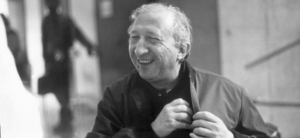 Father Julián Carrón, the President of the Fraternity of Communion and Liberation, the ecclesial movement founded Father Luigi Giussani (who died 7 years ago today) and which was approved by the Church 30 years this past February 11, gave the preliminary research to Angelo Cardinal Scola, Archbishop of Milan, to open the diocesan phase of investigating the eventual beatification and canonization of Father Luigi Giussani.
Father Julián Carrón, the President of the Fraternity of Communion and Liberation, the ecclesial movement founded Father Luigi Giussani (who died 7 years ago today) and which was approved by the Church 30 years this past February 11, gave the preliminary research to Angelo Cardinal Scola, Archbishop of Milan, to open the diocesan phase of investigating the eventual beatification and canonization of Father Luigi Giussani.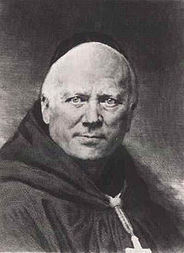
Lent needs some explanation. The liturgical season is so vast and complex one needs to enter into this period of preparation for Easter with eyes wide open. It is a time for our conversion. The famous 19th century Benedictine monk Dom Prosper Guéranger (founder and Abbot of the Abbey of Solesmes 1837-1875) wrote brilliantly of the our Christian life of prayer in a multi-volume collection that is unfinished, The Liturgical Year. While Guéranger's images are typical of the 19th century, they remain crucial, I contend.
Here is his piece on Lent:
Yesterday, the world was busy in its pleasures, and the very children of God were taking a joyous farewell to mirth: but this morning, all is changed. The solemn announcement, spoken of by the prophet, has been proclaimed in Sion: the solemn fast of Lent, the season of expiation, the approach of the great anniversaries of our Redemption. Let us, then, rouse ourselves, and prepare for the spiritual combat.
"...is essentially a gesture of humility, which means that I recognise myself for what I am: a fragile creature made of earth and destined to return to the earth, but also made in the image of God and destined to return to him." (Benedict XVI)
The pope's teaching is heard here...
Prayer
In preparation for today, Ash Wednesday, pray with the readings for the day: Joel 2:12-18; Psalm 51, 12-13, 14 and 17; 2 Corinthians 5:20-6:2; Matthew 6:1-6, 16-18. It is a great lenten practice to review and pray with the daily scripture readings during Lent by visiting the U.S. bishops' website, www.usccb.org/bible/readings.
Asking Lord for forgiveness by receiving the Sacrament of Reconciliation and attending daily Mass.
Spending time with the Lord in the Blessed Sacrament is a superb spiritual practice. 15 minutes in quiet prayer is a true blessing. Time in silence and listening to the Lord and you talking with the Lord from your heart builds a relationship with Him.
Pray the Rosary.
Let's pray for one another.
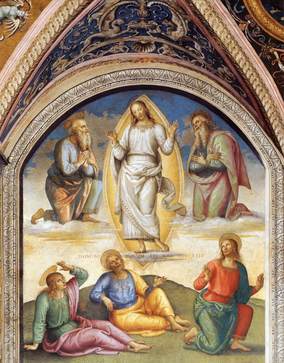 The Byzantine Catholic Church, along with the Maronite
Church, begin the Lenten observance. The Byzantines call today Clean Monday,
the first day of the Great Fast. Maronites call today "Ash Monday." The
Byzantine Orthodox Church will open their Lent on Monday, February 27.
The Byzantine Catholic Church, along with the Maronite
Church, begin the Lenten observance. The Byzantines call today Clean Monday,
the first day of the Great Fast. Maronites call today "Ash Monday." The
Byzantine Orthodox Church will open their Lent on Monday, February 27.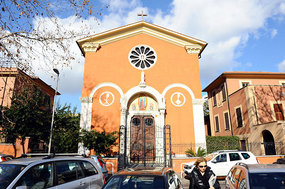 The other day I mentioned that cardinals receive a church in Rome for them to have pastoral solicitude for and to be a parish priest in the Diocese of Rome. The latter is really a fiction because the cardinal rarely has much to do his parish but this a vestige of a time when all cardinals were resident priests of Rome. Cardinal Mahoney never paid too much attention to his Roman church but Cardinal O'Malley shows up to his when he's in Rome.
The other day I mentioned that cardinals receive a church in Rome for them to have pastoral solicitude for and to be a parish priest in the Diocese of Rome. The latter is really a fiction because the cardinal rarely has much to do his parish but this a vestige of a time when all cardinals were resident priests of Rome. Cardinal Mahoney never paid too much attention to his Roman church but Cardinal O'Malley shows up to his when he's in Rome. The Catholic buzz word is the "evangelization." It's running the risk of becoming an irrelevant concept if we don't take the time to really understand the contours of sharing the faith given to us by the Holy Spirit and authentically lived in the communion of the Church. Some bishops from Africa and Europe had a symposium to explore the needs and desires in living Christianity as an event from the 13-17 February. It didn't get much press in these parts because (A) it is perceived that neither Africa and Europe are so far away from North America that what the symposium had to do didn't impact us and (B), well Africa and Europe have little to say to us. Wrong. We are a communion of peoples; live our faith in communion with other Christians around the world not in isolation from the another group of people. What the Church in Africa does should, in fact, shed light on our life of faith. We belong to Christ, therefore to the Church and therefore each other; no Christian is alone.
Listen to what the Pope says here.
Fifty years after the opening of the Second Vatican Council and a few months away from the Synod on New Evangelization, we wanted to look into our hearts about this theme: Evangelization today: Communion and Pastoral Collaboration between Africa and Europe. The human person and God: the Church's mission to proclaim God's presence and love. In this Symposium we have found the joy of reunion, and we have assessed the progress made over these eight years. Indeed, the Beatitudes are our common treasure. More and more, they make us discover our complementary nature, but also our co-responsibility and interdependence in the lives of our local Churches. It's a question of rising to the challenges of an increasingly new Evangelization in our two continents today "For we were all baptized by one Spirit so as to form one body ( ...) and we were all given the one Spirit to drink. Even so the body is not made up of one part but of many" (1 Corinthians 12 :13-14). We have rejoiced for the progress we have made in the last decades in the relations between our two continents - the Synods for Africa and for Europe, as well as our meetings, are a testimony to this very fact.
For the full report, see The Vatican Insider
"God is not isolation, but glorious and joyful love, spreading outwards and radiant with light," Pope Benedict XVI told the assembled crowd gathered for Mass including the new cardinals. The diakonia (the service rendered) of the cardinals' task is "to bear witness to the joy of Christ's love."
"Faith without love would no longer be an authentic Christian faith."
~Pope Benedict XVI
19 February 2012
The Pope, as you know created 22 new cardinals yesterday. He gave them the symbols of office: the cardinal's biretta, a new ring and the title of a church of which they are the "pastor of" in the Diocese of Rome. Today, the feast of the Chair of Saint Peter, the faithful gather around the Pope, the Bishop of Rome, to worship God. The Church celebrates the "throne of Truth", a fitting image of Christ passing onto us a true experience of faith, truth and love. The homily given by Benedict XVI is noted below.
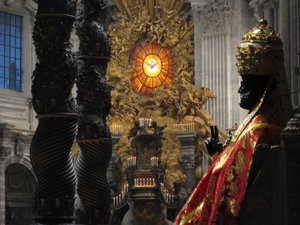
On this solemnity of the Chair of Saint Peter, we have the joy of gathering around the altar of the Lord together with the new Cardinals whom yesterday I incorporated into the College of Cardinals. It is to them, first of all, that I offer my cordial greetings and I thank Cardinal Fernando Filoni for the gracious words he has addressed to me in the name of all. I extend my greetings to the other Cardinals and all the Bishops present, as well as to the distinguished authorities, ambassadors, priests, religious and all the faithful who have come from different parts of the world for this happy occasion, which is marked by a particular character of universality.
In the second reading that we have just heard, Saint Peter exhorts the "elders" of the Church to be zealous pastors, attentive to the flock of Christ (cf. 1 Pet 5:1-2). These words are addressed in the first instance to you, my dear venerable brothers, who have already shown great merit among the people of God through your wise and generous pastoral ministry in demanding dioceses, or through presiding over the Dicasteries of the Roman Curia, or in your service to the Church through study and teaching. The new dignity that has been conferred upon you is intended to show appreciation for the faithful labour you have carried out in the Lord's vineyard, to honour the communities and nations from which you come and which you represent so worthily in the Church, to invest you with new and more important ecclesial responsibilities and finally to ask of you an additional readiness to be of service to Christ and to the entire Christian community. This readiness to serve the Gospel is firmly founded upon the certitude of faith. We know that God is faithful to his promises and we await in hope the fulfilment of these words of Saint Peter: "And when the chief shepherd is manifested you will obtain the unfading crown of glory" (1 Pet 5:4).
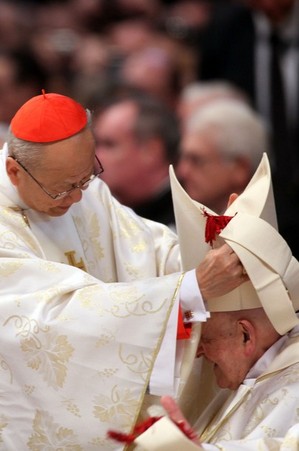
In a public Consistory the Pope created 22 new Cardinals today, though 4 are over 80 years of age and therefore cannot vote in a papal conclave.
At the ceremony in which the Pope creates a cardinal, each one is assigned a church in Rome, a titular or diaconal church. He becomes, in way, the pastor of a Roman parish and thus diocesan priests of Rome and therefore capable of electing the Bishop of Rome. This is "ecclesiology 101a."
The College of Cardinal is divided into three groups, cardinal bishops, priests and deacons. There is a dean and a vice dean of the College. Only by exception are cardinals not bishops or consecrated before being created cardinal per the Code of Canon Law (Cardinal Karl Becker was not consecrated a bishop prior to today's bishop and very often Jesuits created a cardinal who are 80 and above are typically dispensed from being consecrated; Avery Dulles was). Cardinal priests who are diocesan bishops of dioceses, while curial officials are made Cardinal Deacons.
The tradition of the Church is that after a number of years as a cardinal deacon one can be "promoted" to the order of cardinal priests. Some cardinals in key positions, such as the Dean of the College or prefect of an important Vatican congregation, e.g., CDF, are elevated to an open slot among the six Cardinal Bishops. There are seven cardinalatial titular dioceses, but by tradition the Dean always has two, Ostia and one other. There are also a four Cardinal Patriarchs of Eastern Churches, who rank in the College just after the Cardinal Bishops.
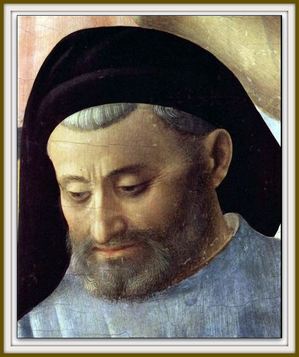
Too many in the world know today's Dominican blessed for a nickname given to him more than his religious name. The Dominicans celebrate Blessed John of Fiesole, the post modern world would know him as Fra Angelico (1387-1455), people in his time also knew him as Guido. His talent and grace was indeed rare among people. Only in 1982 did the Church with Pope John Paul II recognize John's holiness.
A prior post gives a very brief history and the liturgical prayer for Blessed John's feast day here and a 2009 post is here.
Recently, a Dominican friar of the English Province spoke to Vatican Radio saying this of his friar:
"...is to give to others the fruit of our contemplation and painting...first to be communicated and then to be precisely the fruit of contemplation.... because vision is one of the elements of contemplation...traditionally for us heaven will mean the beatific vision..."
Blessed John, Fra Angelico as he's known, was the angelic friar: "... because of the purity, the holiness of his own life...the subject matter...the extraordinary beauty, purity reflected..."
Father Robert Ombres, OP
Raymond of Penyafort Fellow in Canon Law at Blackfriars Hall, University of Oxford
"On the 30th Anniversary of the Pope's recognition of the Fraternity of Communion and Liberation, we ask the Lord for the gratitude for the meeting with Father Giussani's charisma to become a renewed responsibility every day for our Destiny and that of all our human brothers, in our indomitable faithfulness to the Church in history's joyous and tragic events. So let us say a special prayer for the Holy Father, invoking upon him the comfort of the Holy Spirit in this moment of great chaos."
Mass intention for the Fraternity of Communion and Liberation, 2012
Tu es Petrus, et super hanc petram aedificabo Ecclesiam meam.
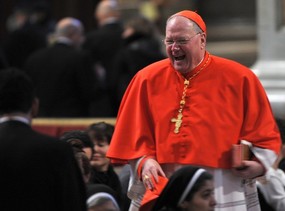
With these words the entrance hymn has led us into the solemn and evocative ritual of the ordinary public Consistory for the creation of new Cardinals, with the placing of the biretta, the handing over of the ring and the assigning of a titular church. They are the efficacious words with which Jesus constituted Peter as the solid foundation of the Church. On such a foundation the faith represents the qualitative factor: Simon becomes Peter - the Rock - in as much as he professed his faith in Jesus as Messiah and Son of God. In the proclamation of Christ the Church is bound to Peter and Peter is placed in the Church as a rock; although it is Christ himself who builds up the Church, Peter must always be a constitutive element of that upbuilding. He will always be such through faithfulness to his confession made at Caesarea Philippi, in virtue of the affirmation, "You are the Christ, the Son of the living God".
The words Jesus addressed to Peter highlight well the ecclesial character of today's event. The new Cardinals, in receiving the title of a church in this city or of a suburban Diocese, are fully inserted in the Church of Rome led by the Successor of Peter, in order to cooperate closely with him in governing the universal Church. These beloved Brothers, who in a few minutes' time will enter and become part of the College of Cardinals, will be united with new and stronger bonds not only to the Roman Pontiff but also to the entire community of the faithful spread throughout the world. In carrying out their particular service in support of the Petrine ministry, the new Cardinals will be called to consider and evaluate the events, the problems and the pastoral criteria which concern the mission of the entire Church. In this delicate task, the life and the death of the Prince of the Apostles, who for love of Christ gave himself even unto the ultimate sacrifice, will be an example and a helpful witness of faith for the new Cardinals.
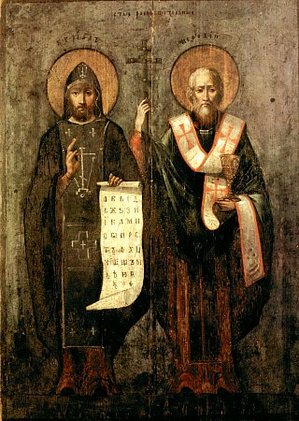 A lot of westerners are not too aware of Saints Cyril and Methodius. However, there's a Polish parish in the Hartford and Bridgeport dioceses and a seminary in Michigan that bear the names of these rather famous saints. So, they are not too obscure but they're not that well-known as they ought to be. In 1985, Blessed John Paul II paid tribute to these two saints in an Encyclical, Slavorum Apostoli, to show the vividness of their witness.
A lot of westerners are not too aware of Saints Cyril and Methodius. However, there's a Polish parish in the Hartford and Bridgeport dioceses and a seminary in Michigan that bear the names of these rather famous saints. So, they are not too obscure but they're not that well-known as they ought to be. In 1985, Blessed John Paul II paid tribute to these two saints in an Encyclical, Slavorum Apostoli, to show the vividness of their witness.
Today, the Holy Father announced his Good Shepherd Sunday missive on vocations. Singed on 18 October 2011, Benedict wrote this letter for the 49th World Day of Prayer for Vocations that's celebrated on the 4th Sunday of Easter, Good Shepherd Sunday. The Pope's message is exactly what I was trying to teach to the RCIA people yesterday: God's love is total and our love for Him needs to be an icon --that is, mirrored-- to the world. His theme this year is: Vocations, the Gift of the Love of God. A few paragraphs of the text follow:
In a famous page of the Confessions, Saint Augustine expresses with great force his discovery of God, supreme beauty and supreme love, a God who was always close to him, and to whom he at last opened his mind and heart to be transformed: "Late have I loved you, O Beauty ever ancient, ever new, late have I loved you! You were within me, but I was outside, and it was there that I searched for you. In my unloveliness I plunged into the lovely things which you created. You were with me, but I was not with you. Created things kept me from you; yet if they had not been in you they would have not been at all. You called, you shouted, and you broke through my deafness. You flashed, you shone, and you dispelled my blindness. You breathed your fragrance on me; I drew in breath and now I pant for you. I have tasted you, now I hunger and thirst for more. You touched me, and I burned for your peace." (X, 27.38). With these images, the Saint of Hippo seeks to describe the ineffable mystery of his encounter with God, with God's love that transforms all of life.
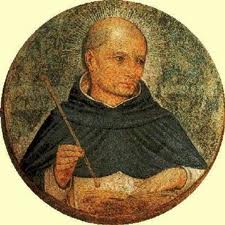 In the Order of Friars Preachers today is the feast of day of Blessed Jordan of Saxony. Blessed Jordan, from Paderborn, Germany (a Saxon noble) known for his piety and charity, was educated at the famed University of Paris. In 1220, he was admitted to the Order by Saint Dominic himself in and a year later was the Prior Provincial for the friars in Lombardy, and a year later he succeeded Dominic as the Master of the Order.
In the Order of Friars Preachers today is the feast of day of Blessed Jordan of Saxony. Blessed Jordan, from Paderborn, Germany (a Saxon noble) known for his piety and charity, was educated at the famed University of Paris. In 1220, he was admitted to the Order by Saint Dominic himself in and a year later was the Prior Provincial for the friars in Lombardy, and a year later he succeeded Dominic as the Master of the Order. 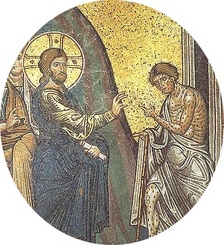
The Church prays today,
O God, who teach
us that you abide in hearts that are just and true, grant that we may be so
fashioned by your grace as to become a dwelling pleasing to you.
What other grace do we need but the grace to abide in Christ? The priest's prayer at Mass in the anamnesis tells us and God that He lives hearts that are just and true.
The Gospel today relates something that calls to mind the work of Saint Damian of Molokai and Blessed soon-to-be-saint Marianne Cope who worked with and evangelized lepers in Hawaii. Their love was extroverted. No doubt the Lord's touch and the saints' humanity was likely the first substantial, real contact these "outcasts" experienced. The Lord's touch of the leper is as the Prayer over the Offering prays, it "cleanses and renews" for the sake of our salvation. So much for us, too. May the Lord touch our uncleanness and sinfulness so that we may be close to Him.
What other than love and compassion did the Lord have for the marginalized? The medical leper and the spiritual leper always have on their lips Psalm 32: "I turn to you, Lord, in time of trouble, and you fill me with the joy of salvation."
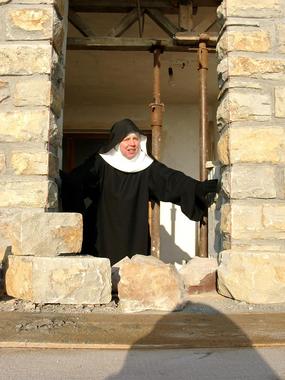 As we celebrate anew the Memorial of the Virgin Saint Scholastica, we pray, O Lord, that, following her example, we may serve you with pure love and happily receive what comes from loving you.
As we celebrate anew the Memorial of the Virgin Saint Scholastica, we pray, O Lord, that, following her example, we may serve you with pure love and happily receive what comes from loving you.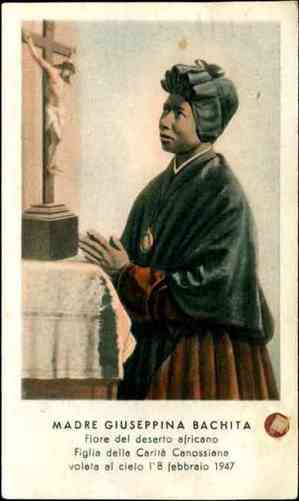
The Lord has loved me so much: we must love everyone...we must be compassionate!
The Church liturgical memorial today commemorate Saint Josephine Bakhita, a woman from the Sudan who was enslaved as a young girl, purchased by an Italian family, educated by the Canossian Sisters in Italy where she was converted and became a member of that religious community.
At Mass for Saint Josephine, we hear the parable of the wise and foolish bridesmaids (Matthew 25); the Communion antiphon is also from that Gospel. Pope Benedict has spoken of Saint Josephine several times in past years. Let us run out to meet the Lord our Saint today did.
The antiphon at Communion
The five prudent bridesmaides were prepared with much oil in their flasks, along with their torches. In the gloom of the midnight, a shout was heard by them: "Behold! the Bridegroom comes! Go out to meet Him, the Christ, our Lord!"
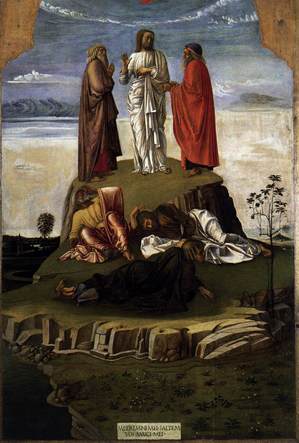
The Pope's lenten message for the Church is rooted in the Letter to the Hebrews by which he develops three aspects of Christian life: concern for others, reciprocity and one's holiness. As he says at the start, Hebrews tells us to have confidence in, trust in, Jesus who is our high priest. The presentation of the message is made by Cardinal Robert Sarah.
Lent begins February 22 with the imposition of ashes beginning a 40 day season of fasting, prayer and almsgiving. In some segments of the Church, spiritual preparations have begun with observing the preparatory Sundays --the pre-Lent-- whereby Christians begin engaging more and more in acts of penance. The Church recommends a gradual acceptance of penance rather than a full scale plunge. One of my favorite narratives in the Gospel is the Transfiguration of Christ. Here Giovanni Bellini does a terrific job in developing my Catholic imagination in helping me to focus on Christ rather than myself. With the assistance of Pope Benedict's lenten message we can help grace become more and more part of our own humanity whereby we are transfigured from doing sinful things to doing things of true Charity.
"Let us be concerned for each other, to stir a response in love and good works"
(Hebrews 10:24)
Dear Brothers and Sisters,
The Lenten season offers us once again an opportunity to reflect upon the very heart of Christian life: charity. This is a favourable time to renew our journey of faith, both as individuals and as a community, with the help of the word of God and the sacraments. This journey is one marked by prayer and sharing, silence and fasting, in anticipation of the joy of Easter.
This year I would like to propose a few thoughts in the light of a brief biblical passage drawn from the Letter to the Hebrews: "Let us be concerned for each other, to stir a response in love and good works". These words are part of a passage in which the sacred author exhorts us to trust in Jesus Christ as the High Priest who has won us forgiveness and opened up a pathway to God. Embracing Christ bears fruit in a life structured by the three theological virtues: it means approaching the Lord "sincere in heart and filled with faith" (v. 22), keeping firm "in the hope we profess" (v. 23) and ever mindful of living a life of "love and good works" (v. 24) together with our brothers and sisters. The author states that to sustain this life shaped by the Gospel it is important to participate in the liturgy and community prayer, mindful of the eschatological goal of full communion in God (v. 25). Here I would like to reflect on verse 24, which offers a succinct, valuable and ever timely teaching on the three aspects of Christian life: concern for others, reciprocity and personal holiness.
 The Assembly of Canonical Orthodox Bishops of North
and Central America, which is comprised of the 65 canonical Orthodox bishops in
the United States, Canada and Mexico, join their voices with the United States
Conference of Catholic Bishops and all those who adamantly protest the recent
decision by the United States Department of Health and Human Services,
and call upon all the Orthodox Christian faithful to contact their elected
representatives today to voice their concern in the face of this threat to the
sanctity of the Church's conscience.
The Assembly of Canonical Orthodox Bishops of North
and Central America, which is comprised of the 65 canonical Orthodox bishops in
the United States, Canada and Mexico, join their voices with the United States
Conference of Catholic Bishops and all those who adamantly protest the recent
decision by the United States Department of Health and Human Services,
and call upon all the Orthodox Christian faithful to contact their elected
representatives today to voice their concern in the face of this threat to the
sanctity of the Church's conscience.
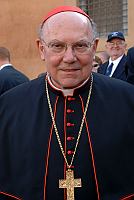
Today, in Rome, there is a Gregorian University sponsored Symposium entitled "Towards Healing and Renewal." It is a four day gathering of professionals and clergy-types who have responsibility for working with victims and family members of sexual abuse. While not personally in attendance, Pope Benedict XVI was present through his personal message sent to participants and with the presence of several cardinals and bishops, Including William Cardinal Levada, 76, Prefect of the Congregation for the Doctrine of the Faith. Cardinal Levada's address, "The Sexual Abuse of Minors: A Multi-faceted Response to the Challenge," follows.
The Pope's message iterates in this context, as he has done in the past, his hope and life's work that "healing for abuse victims must be of paramount concern in the Christian community," with "a profound renewal of the Church at every level." Further, he "supports and encourages every effort to respond with evangelical charity to the challenge of providing children and vulnerable adults with an ecclesial environment conducive to their human and spiritual growth" and he urges the participants in the Symposium "to continue drawing on a wide range of expertise in order to promote throughout the Church a vigorous culture of effective safeguarding and victim support."
The Sexual Abuse of Minors: A Multi-faceted Response to the Challenge Toward Healing and Renewal" is the title given to this Symposium for Catholic Bishops and Religious Superiors on the Sexual Abuse of Minors. For leaders in the Church for whom this Symposium has been planned, the question is both delicate and urgent. Just two years ago, in his reflections on the "Year for Priests" at the annual Christmas greetings to the Roman Curia, Pope Benedict XVI spoke in direct and lengthy terms about priests who "twist the sacrament [of Holy Orders] into its antithesis, and under the mantle of the sacred profoundly wound human persons in their childhood, damaging them for a whole lifetime." I chose this phrase to begin my remarks this evening because I think it important not to lose sight of the gravity of these crimes as we deal with the multiple aspects the Church's response.
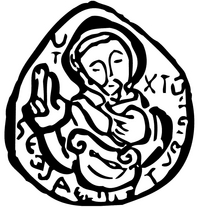 Those who follow the lay ecclesial movement, Communion
and Liberation, and attend the weekly School of Community, know that we've come
to end of our work on Father Luigi Giussani book, the The Religious Sense. For the
coming year we will be working on Giussani's At the Origin of the Christian
Claim. On January 25, 2012, at the Teatro degli Arcimboldi, Milan, Father Julián
Carrón's made a presentation of Father Luigi Giussani's book.
Those who follow the lay ecclesial movement, Communion
and Liberation, and attend the weekly School of Community, know that we've come
to end of our work on Father Luigi Giussani book, the The Religious Sense. For the
coming year we will be working on Giussani's At the Origin of the Christian
Claim. On January 25, 2012, at the Teatro degli Arcimboldi, Milan, Father Julián
Carrón's made a presentation of Father Luigi Giussani's book. 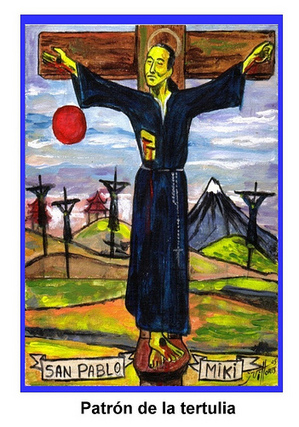
O God, strength of all the Saints, who through the Cross were pleased to call the Martyrs Saint Paul Miki and companions to life, grant, we pray, that by their intercession we may hold with courage even until death to the faith that we profess.
The question of who was Saint Paul Miki is dealt with on Rome Reports today. The video gives a brief intro the life of the martyr and his companions.
From the cross, Paul said: "The sentence of judgment says these men came to Japan from
the Philippines, but I did not come from any other country. I am a true
Japanese. The only reason for my being killed is that I have taught the
doctrine of Christ. I certainly did teach the doctrine of Christ. I thank God
it is for this reason I die. I believe that I am telling only the truth before
I die. I know you believe me and I want to say to you all once again: Ask
Christ to help you to become happy. I obey Christ. After Christ's example I
forgive my persecutors. I do not hate them. I ask God to have pity on all, and
I hope my blood will fall on my fellow men as a fruitful rain."
The 2011 post on Saint Paul Miki and his companions
The 2010 post on Nagasaki martyrs Paul Mike, et al.
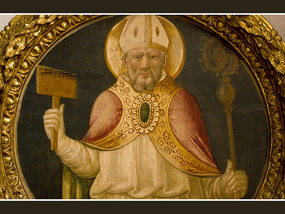
Hear, O Lord, the supplications your people make under the patronage of the Martyr Saint Blaise, and grant that they may rejoice in peace in this present life and find help for life eternal.
(the Collect at Mass)
From the Roman Martyrology we read:
At Sebaste in Armenia [in the 4th century], in the time of the governor Agricolaus, the passion of Saint Blaise, bishop and martyr, who, after working many miracles, was scourged for a long time, suspended from a tree where his flesh was lacerated with iron combs. He was then imprisoned in a dark dungeon, thrown into a lake from which he came out safe, and finally, by order of the judge, he and two boys were beheaded. Before him, seven women who were gathering the drops of his blood during his torture, were recognized as Christians, and after undergoing severe torments, were put to death by the sword.
A dear friend of mine, Father Richard Cipolla published an article today in the Wall Street Journal on what it means for a faithful Christian to belong to Christ faithfully, moving from an Episcopal Church to full communion with the Catholic Church and being a married Catholic priest. The life of sacrifice and joy is clear in Cipolla's story. For me, it is a testament of grace to know Father Richard and his wife, Cathy, and to have met his children. Wouldn't be good if all the clergy could say that with conviction and love. Last week Father Richard celebrated his anniversary of ordination to the Catholic priesthood on January 28 in the Diocese of Bridgeport. Let us pray for him and Holy Mother Church.
The WSJ article follows:
Being a Catholic Priest--and Married
The pope has created a new diocese for bringing Episcopalians into the church.
By Richard Cipolla
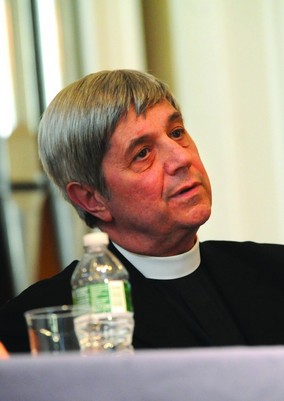
Last month, Pope Benedict announced the formation of an American "ordinariate," or special diocese for Episcopal congregations that want to move to Roman Catholicism (driven largely by Episcopalianism's liberal drift). These congregations, the pope ruled, could keep some of their Anglican liturgy. More significantly, a small but sizable number of married Episcopal priests will now become married Catholic priests.
As a married Catholic priest ordained in 1984 under a special provision set forth by Pope John Paul II (for individual priests, judged on an individual basis), I have closely followed Pope Benedict's announcement. I rejoice in this catholic and generous gesture by the pope and am overjoyed that these priests and their families will be welcomed into the Catholic Church. But that is not to say it won't bring its own share of challenges.
My experience as a married Catholic priest for 28 years brings to mind several thoughts, both practical and spiritual. First, the church must support new priests' families financially. During my first years as a married Catholic priest, there were times when we could not pay the heating bill. When I was ordained, it was made quite clear to me that I should not look to the church as my main source of income but rather to a full-time job outside of the church. My parish duties have thus always been secondary.
One of the blogs I read with some frequency is the blog, Domine, da mihi hanc aqua!, written by a Dominican Friar of the Province of Saint Martin de Porres, Father Philip Neri Powell. I recommend it, after reading the Communio blog. His blog post for today provides a good examination for. Tonight, people came to the parish to watch the second video of Father Robert Barron's "Catholicism" project. In many ways what the friar says below and what Father Baron did in the video cohere. Read Father Philip wrote (in part) and watch "Catholicism."
The Catechism teaches us that "the Word became flesh for us in order to [1] save us by reconciling us with God. . .[2] so that thus we might know God's love. . .[3] to be our model of holiness. . .[4] to make us 'partakers of the divine nature'"(457-60). Let's break this down even further. Since we are alienated from God by our sin and God wills that we be reconciled with Him, our sins must be expunged, washed away. With the birth, death, and resurrection of the Christ, our sins are forgiven. For God's forgiveness to take hold in our lives, we must receive His forgiveness as a gift--an unmerited grace, freely given. When we receive His forgiveness as a gift, we come to know the Father's love; that is, His love is made manifest, given another body and soul--our own. With a body and soul brimming with the Father's love, we begin a life of holiness, a life set apart from the world while living in the world. A life of holiness looks, sounds, and feels like the life that Jesus himself led: a life of mercy, sacrifice, love, perseverance, and courage. Living such a life--steeping ourselves in God's enduring love--trains us to participate more fully in His divine nature, making us both human and divine, and perfectly so in His presence.
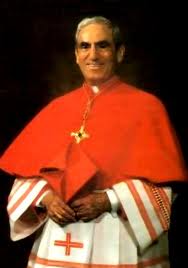
Last evening at 9:15pm, Anthony Joseph Cardinal Bevilacqua, 88, 7th archbishop of Philadelphia, died in his sleep in his quarters at Saint Charles Borromeo Seminary. He retired from his episcopal duties in 2003.
Philly.com has an extended article on the late Cardinal (1923-2012). He was appointed to the Archdiocese of Philadelphia in 1987 and installed in 1988.
The Pope's note of condolence to Archbishop Charles J. Chaput, OFM Cap, and the Archdiocese of Philadelphia:
HAVING LEARNED WITH SADNESS OF THE DEATH OF CARDINAL ANTHONY BEVILACQUA, ARCHBISHOP EMERITUS OF PHILADELPHIA, I OFFER MY HEARTFELT CONDOLENCES TO YOU AND TO ALL THE FAITHFUL OF THE ARCHDIOCESE. I JOIN YOU IN COMMENDING THE LATE CARDINAL'S SOUL TO GOD, THE FATHER OF MERCIES, WITH GRATITUDE FOR HIS YEARS OF EPISCOPAL MINISTRY AMONG CHRIST'S FLOCK IN PHILADELPHIA, HIS LONGSTANDING COMMITMENT TO SOCIAL JUSTICE AND THE PASTORAL CARE OF IMMIGRANTS, AND HIS EXPERT CONTRIBUTION TO THE REVISION OF THE CHURCH'S LAW IN THE YEARS FOLLOWING THE SECOND VATICAN COUNCIL. TO YOU, AND TO ALL THE CLERGY, RELIGIOUS AND LAITY OF THE CHURCH IN PHILADELPHIA, AND TO THE MEMBERS OF HIS FAMILY, I CORDIALLY IMPART MY APOSTOLIC BLESSING AS A PLEDGE OF CONSOLATION AND PEACE IN OUR LORD JESUS CHRIST.
BENEDICTUS PP. XVI
May God be merciful to His Eminence.
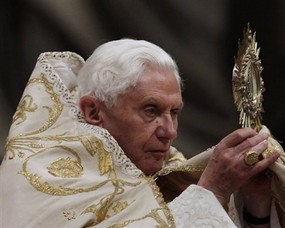 Praying with Pope Benedict XVI for the needs of the Church and people of good will, let's raise our hearts to the Lord with the following:
Praying with Pope Benedict XVI for the needs of the Church and people of good will, let's raise our hearts to the Lord with the following: